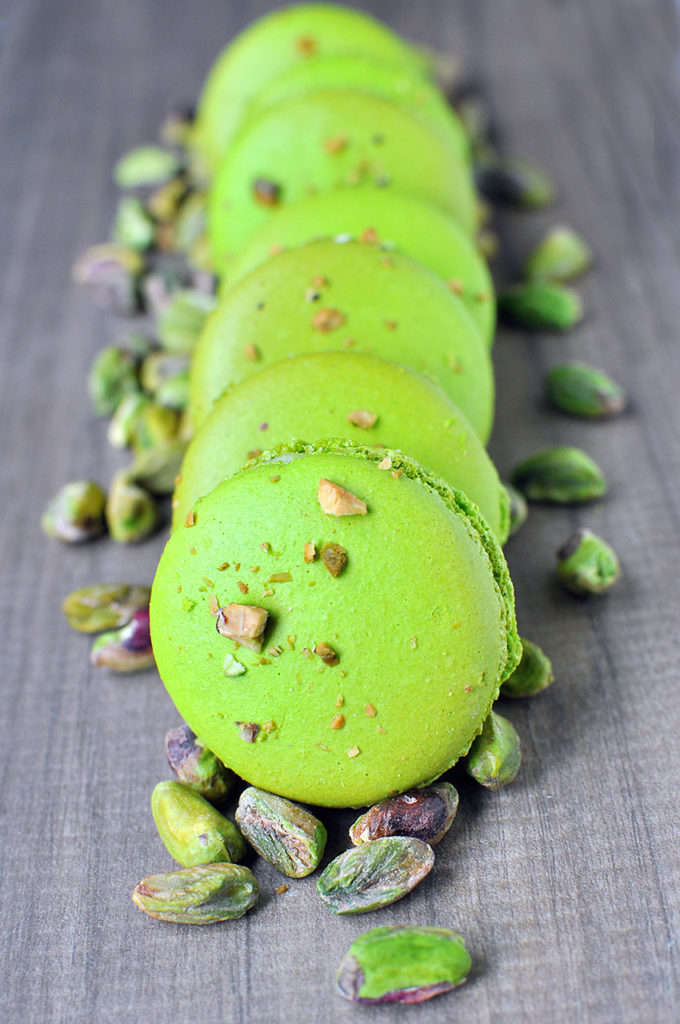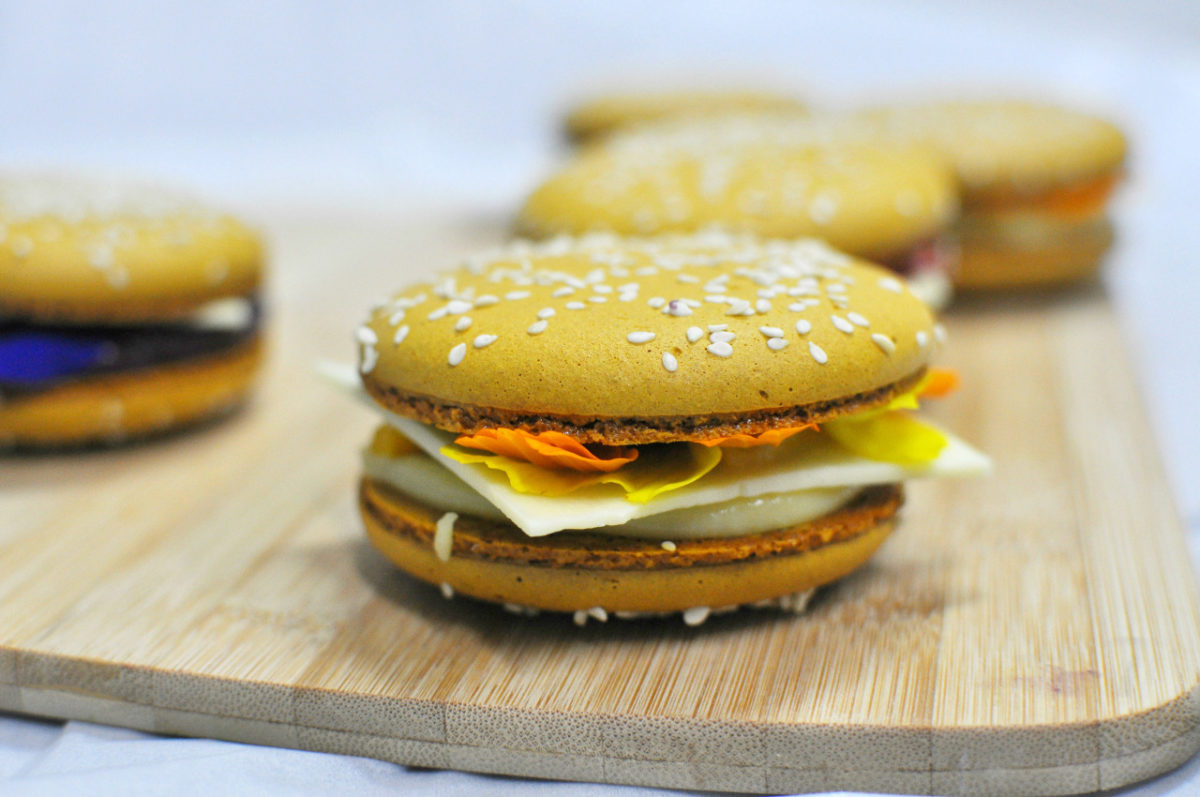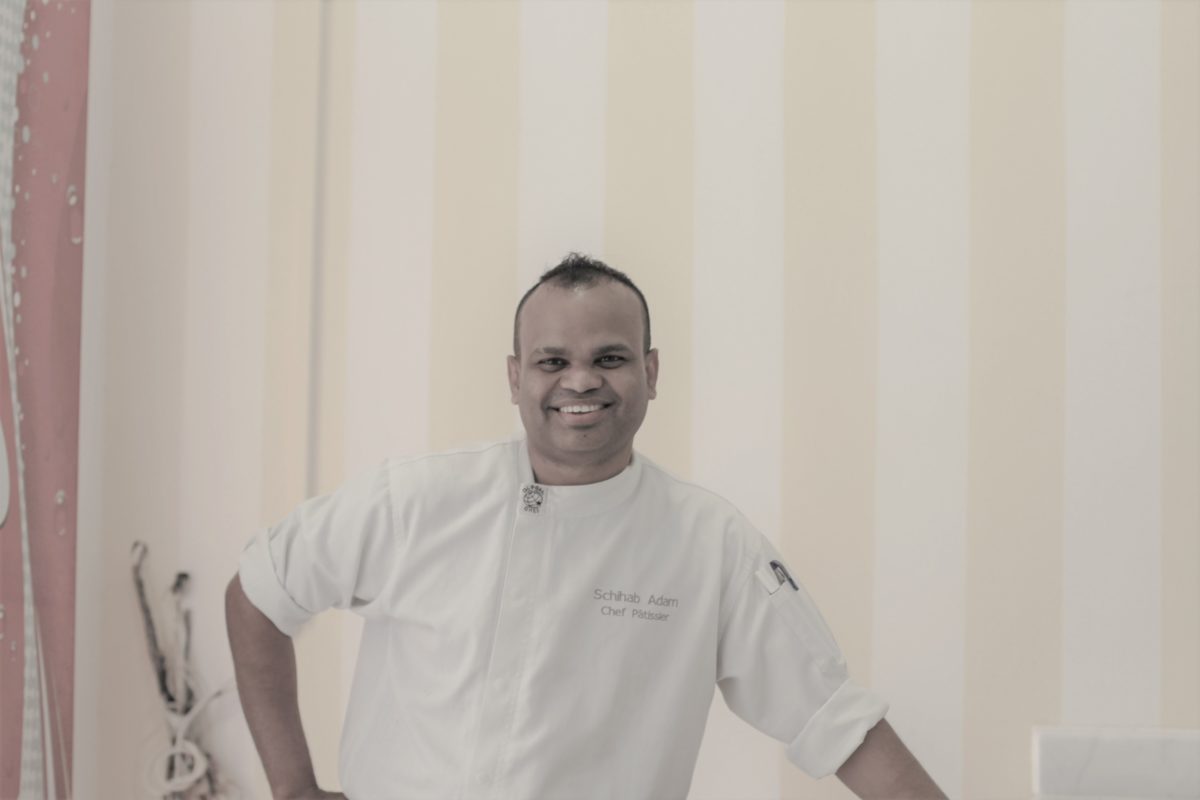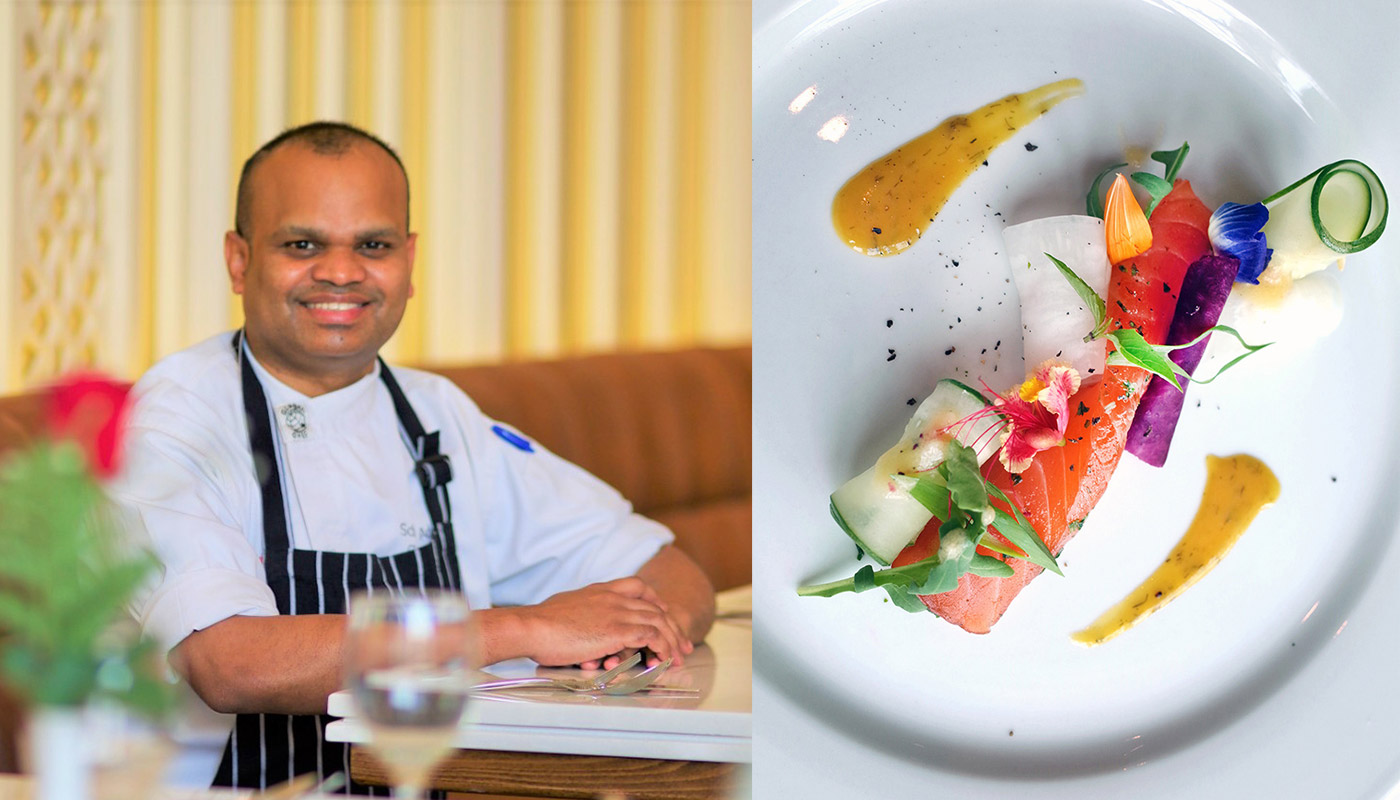Chef Adam Schihab (born 17 December 1981) is a Maldivian entrepreneur, chef, author, and food influencer. Schihab is an internationally renowned pastry chef and has worked with several five-star hotels including the Four Seasons, Waldorf Astoria, Conrad Hilton Dusit Thani, Ritz-Carlton, and Relais & Châteaux. He runs a professional network for chefs, “Chef’s Network” that connects several renowned chefs globally and share their work. Right after the launch, “Chef’s Network” has seen massive growth and has amassed well over 150,000 followers on Instagram. He can also be followed on his personal Instagram account.
When did you first know you wanted to be a chef?
Back in 1998, my uncle introduced me to a friend who let me work in his Maldives Male café, called Harbour Café. At first, I served food behind the counter. Next I was sent to the manager of an Italian club resort, where I worked in the kitchen washing pots. Not a glamorous start, but I kept working. I started to assist the Italian chef, who first taught me to hold a chef’s knife properly and how to cut up vegetables, mix sauce, and cook pasta. I used to work 17 hours a day, and in my spare time I used to help our Italian pastry chef. He liked me a lot and requested our executive chef to transfer me to pastry, where he let me wear my first chef’s uniform. That’s how I ended up working in pastry.

What were some of the most difficult lessons you had to learn as a young chef?
I worked with a French chef who would throw plates of food at me when I messed up on presentation. I had to learn the importance of always trying to follow the recipes and never failing to adapt the presentation that was implemented by your senior chef. Also, of course, you can’t ever stop learning.
Tell us about the culture in kitchens that you run. How do you create a healthy atmosphere for employees while also keeping high standards?
To be Executive chef and head of operation and large volume driven business you have to be good mentor and motivator.
First it starts with you. For instance, I exercise daily. I eat healthy food.
Staying mentally and physically strong is they key to make others feel strong and understand human behaviour. Kitchen culture is like an onion; with many layers. I do lot of activity to keep my team motivated and to get best out of them.
You need to earn respect, not just expect it because of your title. You need to cultivate a good relationship with every member of your staff – from kitchen steward all the way up to Executive Sous Chef.
We have multi-cultural team and it always goes by the ranking from Commis chef to chef de partie. I never deal with my commis, too often, when they make mistake, I will ask their immediate supervisor and ensure they receive proper training how to handle any task from making dish or mis-en-place or preparations.
I will always delegate and coordinate work with my sous chef then assign the task through documents.
I will ensure everyone get served with respect and dignity and we always care each other as a team, leadership roles as their manager it is my duty all my team member voice is heard create positive working environment
One of the most important things I do is to have direct meeting sessions every week with my low ranking team and listen to their complaints. I do the same with my senior team members.
I worked in five-star hotel that we have catered more than 10,000 people and it is all about organisation and management.

Is it difficult to balance the love of food and cooking with the demands of running a profitable business? How do you keep balance in your life?
For the past 15 years, I’ve served in 11 countries as an Executive Pastry chef. So yes, my background is in pastry and bakery, however, since 2014 my role has shifted somewhat. I became an Assistant Vice President of a large catering and hotel chain and I began to study for a Master’s Degree from University of Liverpool online.
Without that education, managing would be extremely hard for to understand grow through the ladder of leadership.
Being Head chef is challenging position and but then you learn how to delegate and train your team make your life lot easier lot of chef they think they should be checking everything by their own eye.
I can let my chef de cuisines serve excellent degustation menu while I am out having dinner with my family and next morning, I will bring him to my office tell him how proud I was my team did an excellent job when I am away, it makes me feel that I was a good trainer my term performs as good when I am.
- Train your team
- Guide your team
- Encourage your team
- Give them credit for the good job they done
- Learn to delegate
- Do not be a dictator
- Do not speak rude and always respect each other
- Speak calmy and politely but take no prisoner
- But be firm and be tough
- Implement all progress through documentations daily
Who are some of your culinary heroes? Why do you look up to these people in particular?
I have so many to mention, but in particular:
- Chef Simon Sperling – German Executive chef with 25 years of experience I learn lot from him
- Gregoire Michaud – Swiss Chef gave me floppy drive full of his own recipes when he left Four-season Maldives back in 2001, he thought me a lot.

What projects are you working on that you are most excited about?
We just set up a business focused on catering to coffee shops, hotels and restaurants If you’re a hotel looking for a 2,000 croissants a day, or hundreds of loaves of bread, we can serve them freshly made daily.
And we just opened a 75-seater semi-fine dining restaurant in Saudi Arabia, A Khobar. We introduced a 7 course menus with pairing drinks – I got in trouble for calling them “wine dinners” even though the beverage pairings all non-alcoholic!
Your book “The Islander Chef” published this year, features some of your recipes. what makes your recipes stand out in comparison with others?
The Islander Chef recipes book was successfully published through 23 of the best online stores, however after publishing we realized that the font size of the book vs printer version were different. So I had to put sales on hold for now. I am staring to work on revisions with 200 more recipes will be published in 2nd quarter of 2021.
In The Islander Chef highest recipes decadent chocolate cake and polish, Macarons are one of highlighted recipes most requesting by my Instagram followers.
I understand you ordinarily do a lot of traveling for work, how has that been affected by COVID-19?
I travelled between Saudi and Bahrain and Dubai. I am based in Saudi Arabia.
Covid-19 hasn’t affected us as much in Saudi Arabia as it continues to in other parts of the world. We have opened our new restaurant during the pandemic and it became very successful, thanks to god for that.
Has your business adapted to COVID-19 in any other ways?
Local government is very smart and supportive, Unlike USA, we have all Covid-19 precautions in place during the pandemic and Saudi Arabia has adapted a smart plan. They let us work certain hours every day during pandemic, we are still wearing masks. Anyone found without a mask will be fined.
And other safety measures were implemented to support the business to ensure it runs smoothly. Since August we have opened fully because the operation became so busy.

Finally, what advice would you share with young chefs and cooks that want to work their way up to have a position like yours?
They should focus on their future instead of being distracted by“entertainment” that is not going to pay their bills. I suggest that you keep yourself and your family busy with activities that bring value to your life, such as financial education.
I have seen a chefs in their 70’s still looking for a job. You have to plan your future to ensure financial stability.
For example, I read one book a month and I have subscriptions to over five bookstores. I have become a better person than I was five years ago.
If you are working in Housekeeping, read books related to housekeeping; if you are in Customer Service, read books about customer service.
Keep improving and keep pushing yourself to become a better person every day! Learn to discipline yourself and learn to behave properly, to be calm, bright and respectful.
Monitor your progress and plan your days ahead so that you don’t waste time.
Drop your ego. If someone tells you that they have no ego, you know that they have a massive ego.
Learn your weak points and work on improving them. Be positive and speak positive, using positive words. Listen to motivational podcasts and watch motivational videos.
Do not do your job for the sake of the money; do it because you love doing it. The money will follow later.



